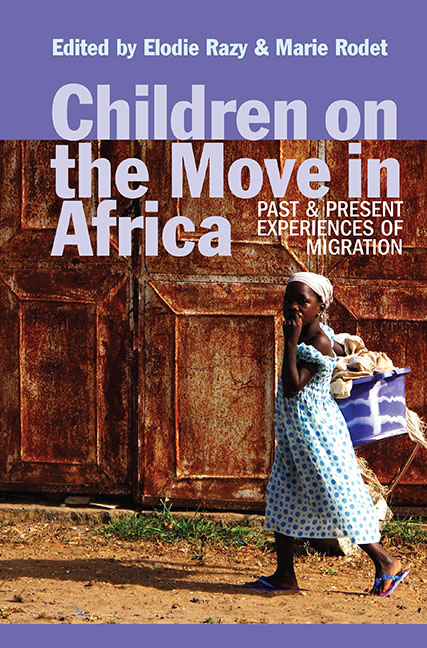Book contents
- Frontmatter
- Contents
- List of Illustrations
- Notes on Contributors
- Preface
- Acknowledgements
- Introduction: Child Migration in Africa: Key Issues & New Perspectives
- Part I CHILD MIGRANTS IN AFRICA: BEYOND THE DILEMMA OF VULNERABILITY v. AGENCY
- Part II BEING A CHILD & BECOMING A GENDERED ADULT: THE CHALLENGES OF MIGRATIONS IN CHILDHOOD
- Part III MOBILITY, IMAGINATION & MAKING NATIONS
- 6. Childhood, Space & Memory: Migrations of the Métis in Madagascar's Central Highlands (Nineteenth & Twentieth Centuries)
- 7. ‘We Were Mixed with All Types’: Educational Migration in the Northern Territories of Colonial Ghana
- 8. India–South Africa Mobilities in the First Half of the Twentieth Century: Minors, Immigration Encounters in Cape Town & Becoming South African
- 9. Education, Migration & Nationalism: Mapping the School Days of the First Generation of Southern Sudanese Nationalist Leaders, c. 1948–1972
- 10. Child Narration as a Device for Negotiating Space & Identity Formation in Recent Nigerian Migrant Fiction
- Bibliography
- Index
6. - Childhood, Space & Memory: Migrations of the Métis in Madagascar's Central Highlands (Nineteenth & Twentieth Centuries)
from Part III - MOBILITY, IMAGINATION & MAKING NATIONS
Published online by Cambridge University Press: 25 October 2017
- Frontmatter
- Contents
- List of Illustrations
- Notes on Contributors
- Preface
- Acknowledgements
- Introduction: Child Migration in Africa: Key Issues & New Perspectives
- Part I CHILD MIGRANTS IN AFRICA: BEYOND THE DILEMMA OF VULNERABILITY v. AGENCY
- Part II BEING A CHILD & BECOMING A GENDERED ADULT: THE CHALLENGES OF MIGRATIONS IN CHILDHOOD
- Part III MOBILITY, IMAGINATION & MAKING NATIONS
- 6. Childhood, Space & Memory: Migrations of the Métis in Madagascar's Central Highlands (Nineteenth & Twentieth Centuries)
- 7. ‘We Were Mixed with All Types’: Educational Migration in the Northern Territories of Colonial Ghana
- 8. India–South Africa Mobilities in the First Half of the Twentieth Century: Minors, Immigration Encounters in Cape Town & Becoming South African
- 9. Education, Migration & Nationalism: Mapping the School Days of the First Generation of Southern Sudanese Nationalist Leaders, c. 1948–1972
- 10. Child Narration as a Device for Negotiating Space & Identity Formation in Recent Nigerian Migrant Fiction
- Bibliography
- Index
Summary
This chapter offers an analysis of métis children's migrations, highlighting the importance of family and entourage in their trajectories. This element is a significant contribution, offering a new perspective on métis’ history by jeopardizing the colonial description of the métis as isolated, vulnerable and without family.
The mobility of the métis during the colonial period was obviously not peculiar to them. For example, Whittaker with Hayer, in Chapter 9, explore the strong link between mobility and education, highlighting that moving was a central part of the experience of schooling. The métis nonetheless offered one strong specificity: more than for any other Malagasy children, migration was part of their family story, since one of their parents was from Europe. Their genealogical link with Europe could remain a remote horizon when they had no more connection with their European parent, or could become real through actual mobility to Europe. Their family was crucial in that process.
Madagascar became a French colony in 1896. Europeans settled on the island in large numbers when compared to the other French colonies in Africa (with the exception of Algeria). Their number rose from 9,773 in 1905 to around 25,000 in the 1930s and more than 57,000 in 1960. In 1951, almost 50 per cent of these Europeans were living in Madagascar's Central Highlands, which is the area I will focus on in this chapter. Métis were only a small fraction, less than 0.1 per cent, of the Malagasy population, which numbered over 2.5 million in 1905, more than 3.5 million in the 1930s and upwards of 5 million in 1960.
The colonial order revolved around several antithetical pairs, expressed in legal (citizen/subject), racial (white/black) and cultural (European/Malagasy) terms. The existence of the métis blurred the lines between these poles. Unions between Malagasy and Europeans, whether regular marriages or temporary unions, were quite common. However, the great majority of métis were born from relations out of wedlock. In most cases, the father was European and the mother Malagasy. In 1938, a governmental mission carried out a survey of the ‘Métis problem’ in the French colonies: at the time, there were 1,330 métis in Madagascar's Central Highlands, 693 of whom were under the age of 15 years.
- Type
- Chapter
- Information
- Children on the Move in AfricaPast and Present Experiences of Migration, pp. 125 - 140Publisher: Boydell & BrewerPrint publication year: 2016



